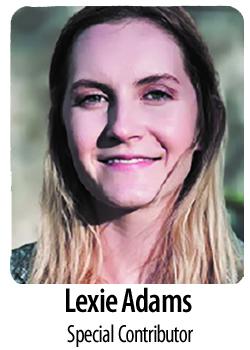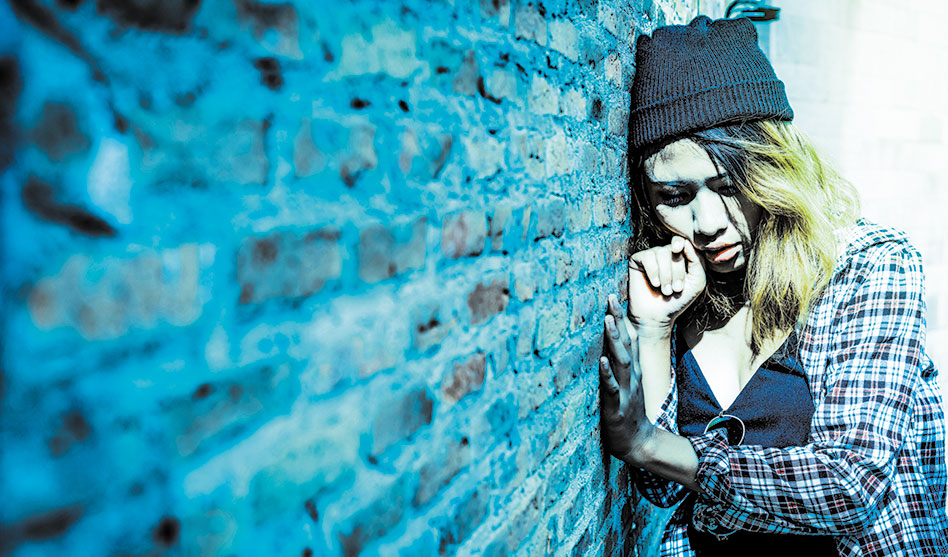The mental health crisis in the LGBTQIA+ community
 What would you do if someone told you that if you wanted to be yourself, you would have to give up your home, career and family connections? I’m sure most of us would be fuming with aggression, screaming and spitting with rage. No matter who you are, we all want to live our lives happily while remaining true to ourselves. Striving for mental wellness is full of ups and downs, and we all face different fights.
What would you do if someone told you that if you wanted to be yourself, you would have to give up your home, career and family connections? I’m sure most of us would be fuming with aggression, screaming and spitting with rage. No matter who you are, we all want to live our lives happily while remaining true to ourselves. Striving for mental wellness is full of ups and downs, and we all face different fights.
Individuals within the LGBTQIA+ community experience unique barriers when navigating the road less traveled to mental wellness. The discrimination and lack of inclusivity in our heteronormative world leads to disproportionate rates of mental illness in the LGBTQIA+ community. So it’s important to note that being LGBTQIA+ is not a mental illness. But frequent exposure to rejection and discrimination leads to emotional distress, which over time festers into mental illness.
Research done in the past decade is encouraging when considering the progress in bringing awareness to the realities of these disparities. As a society, we must unite to create an uplifting environment where discrimination against sexual and gender minorities no longer exists. To end this mental health crisis, members of the LGBTQIA+ community must find acceptance in our society when expressing their diverse identities.
Nowadays, finding support from friends within the LGBTQIA+ community is more common, and having reliable relationships contributes to mental wellness.
Unfortunately, many LGBTQIA+ folks still experience rejection from friends, peers and even the family members they depend on the most. It is essential to make inclusive education available for families and parents to give LGBTQIA+ youth a head start toward mental wellness.
The Family Acceptance Project, created by Caitlin Ryan, Ph.D., ACSW, is a phenomenal resource for educating families on accepting their LGBTQ children.
The reality of mental illness in the LGBTQ+ community is heavy; many individuals struggle with depression, anxiety, addictions, homelessness, PTSD or suicide. Statistically, 30-60 percent of lesbians, gay men, bisexuals and transgender people experience anxiety and depression at some point in their lives, which is 1.5-2.5 times higher than among heterosexual or cisgender individuals (Brad Brenner, PhD, “Understanding Anxiety and Depression for LGBTQ People,“ Anxiety and Depression Association of America, ADAA).
Terrifyingly, LGBTQ+ youth are 120 percent more likely to experience homelessness than non-LGBTQ+ youth, according to the National Alliance on Mental Illness.
And shelters are not always safe for LGBTQ+ people, which can make people hesitant to stay there. The mental illnesses people may already be experiencing are only exacerbated without secure housing.
Dallas Hope Charities is a local non-profit organization working to improve conditions in our society for the LGBTQIA+ community. They provide aid to LGBTQIA+ young adults experiencing homelessness and offer a workshop series called Hopeful Discussions geared toward reducing homophobia by increasing understanding of LGBTQ+ identities and issues to educate and build a more inclusive community. Taking advantage of these workshops will equip society to challenge harmful communication habits that are taking a horrendous toll on the mental health of the LGBTQIA+ community.
Inclusive speech is an important starting point. Here are some of the basics:
• Never assume you know someone’s background, sexual identity, pronouns, or gender expression. Instead, be mindful of expressing curiosity, ask questions thoughtfully, and learn how to apologize.
• Learn considerate LGBTQIA+ terminology, and encourage others to eliminate harmful labels, stereotypes, and statements that may alienate someone.
• Recognize unintentional bias (otherwise known as treating someone differently based on a stereotype) and work to deconstruct these unconscious associations.
Therapy is often an excellent resource for LGBTQIA+ people who are learning to accept and love themselves despite facing discrimination. Not all therapists are trained to work with LGBTQIA+ people, and some might not properly understand each individual. Room For Change is a team of therapists in the DFW area dedicated to embracing LGBTQIA+ people through their unique healing journeys. Therapists at Room for Change understand these barriers and create space for LGBTQIA+ individuals to experience self-love through therapeutic communication.
Amanda Esquivel LPC-S, lead counselor and owner at Room for Change, says, “Learning how to overcome these challenges while remaining true to yourself is the only way to fully understand how powerful you are.”
Although standards are improving, the lack of inclusivity in our society has significantly degraded the mental health of LGBTQIA+ people. We must understand the weight of our behaviors and take serious consideration to make our environment happier and healthier for the LGBTQIA+ community.
So consider yourself and how your position in life gives you unique opportunities to encourage others to be themselves unapologetically. Your power to be uplifting and accepting is much stronger than you think.
Lexie Adams, RN, BSN, graduated with her BSN from the University of Texas at Arlington in 2019 and has worked as a nurse in many different ICUs across the U.S., caring for patients and their families. She began her own business as a nurse writer so that her voice and expertise could be devoted to the betterment of the community’s health and wellness. She hopes to continue to work alongside strong people who share her passion for humanity. She can be reached at nurseinkdfw@gmail.com
This copyrighted paper was published for Dallas Hope Charities, Inc., a Dallas-based 501(c)(3) nonprofit. June 2023. For a complete list of resources used in compiling this article, visit DallasVoice.com.
…………………
Sources:
1.John Ecker, Tim Aubry & John Sylvestre (2019) A Review of the Literature on LGBTQ Adults Who Experience Homelessness, Journal of Homosexuality, 66:3, 297-323, DOI: 10.1080/00918369.2017.1413277. Accessed April 15, 2023.
2. Ryan, C. Supportive families, healthy children: Helping families with lesbian, gay, bisexual &
transgender children. San Francisco, CA: Family Acceptance Project, Marian Wright
Edelman Institute, San Francisco State University. https://familyproject.sfsu.edu/sites/default/files/documents/FAP_English%20Booklet_pst.pdf . 2009. Accessed April 15, 2023.
3. LGBTQ+ communities and Mental Health. Mental Health America. https://mhanational.org/issues/lgbtq-communities-and-mental-health#Source%204 . Published 2023. Accessed April 15, 2023.
4. Brenner, B. Understanding anxiety and depression for LGBTQ people. Anxiety and Depression Association of America, ADAA. https://adaa.org/learn-from-us/from-the-experts/blog-posts/consumer/understanding-anxiety-and-depression-lgbtq . Published October 28, 2022. Accessed April 21, 2023.
5. LGBTQI. LGBTQI | NAMI: National Alliance on Mental Illness. https://www.nami.org/Your-Journey/Identity-and-Cultural-Dimensions/LGBTQI . Published 2023. Accessed April 15, 2023.
6. Garey, J. Mental Health Challenges of LGBTQ+ Kids – Child Mind Institute. Child Mind Institute. https://childmind.org/article/mental-health-challenges-of-lgbtq-kids/ . Published July 12, 2022. Accessed April 21, 2023.
7. Russell ST, Fish JN. Mental Health in Lesbian, Gay, Bisexual, and Transgender (LGBT) Youth. Annu Rev Clin Psychol. 12:465-487. doi:10.1146/annurev-clinpsy-021815-093153 . https://www.ncbi.nlm.nih.gov/pmc/articles/PMC4887282/ . Published January 14, 2016. Accessed April 15, 2023.
8. Moagi MM, van Der Wath AE, Jiyane PM, Rikhotso RS. Mental health challenges of lesbian, gay, bisexual and transgender people: An integrated literature review. Health SA. 2021;26:1487. doi:10.4102/hsag.v26i0.1487 . https://www.ncbi.nlm.nih.gov/pmc/articles/PMC7876969/ . Published January 20, 2021. Accessed April 15, 2023.
9. Our Services LGBTQ+ Counseling. Room for Change | Therapy Practice. https://roomforchange.info/services . Published 2022. Accessed April 15, 2023.
10. Smith, A. 4 Ways To Create An Inclusive Community. Sanford School. Retrieved April 21, 2023, from https://blogs.sanfordschool.org/4-ways-to-create-an-inclusive-community . Published February 22, 2019. Accessed April 15, 2023.
11. Hopeful Discussions | Dallas Hope Charities. Dallas Hope Charities. https://www.dallashopecharities.org/programs/hopeful-discussions/ . Published 2023. Accessed April 15, 2023.
12. Hopeful Discussions Intro to LGBTQ+ Allyship. Dallas Hope Charities, Inc.. Powerpoint presentation. Accessed April 11, 2023.
13. Ryan, C., Huebner, D., Diaz, R. M., & Sanchez, J. (2009). Family rejection as a predictor of negative health outcomes in white and Latino lesbian, gay and bisexual young adults. Pediatrics,123(1), 346-352. https://doi.org/10.1111/j.1744-6171.2010.00246.x
14. LGBTQ Family Acceptance. Family Acceptance Project® LGBTQ Youth & Family Resources To Decrease Mental Health Risks & Promote Well‐Being. Accessed May 11, 2023. https://lgbtqfamilyacceptance.org/.
15. Welcome to the Family Acceptance Project®. Welcome to the Family Acceptance Project® | Family Acceptance Project ®. Accessed May 11, 2023. https://familyproject.sfsu.edu/.
Interview with Amanda Esquivel LPC, S from Room For Change on April 20, 2023.


